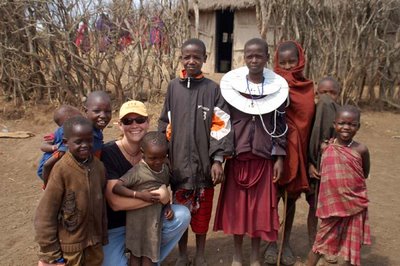 This week I had an amazing opportunity to spend two days and overnight in a Maasai village called Eluyai, about 3 hours from Arusha. Mileage-wise, it’s really not very far, but in terms of road conditions (or lack of roads) and culture, it’s another world enti
This week I had an amazing opportunity to spend two days and overnight in a Maasai village called Eluyai, about 3 hours from Arusha. Mileage-wise, it’s really not very far, but in terms of road conditions (or lack of roads) and culture, it’s another world enti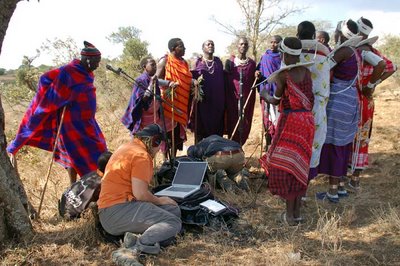 rely. PHF has a video/recording/production team here for two weeks to do some filming and photography of PHF. Andrea and Charles are absolutely amazing at what they do, which is creating magic. They are able to see and record images and events in a way that draw you into that experience and make you feel like you’re really there. They are also tremendous blessings in that they donate their time and talents to PHF to make our work here come alive. One of their tasks was to record traditional Tanzanian music, including the Maasai. That's Andrea manning the computer and Charles hunched over to snap one of those photos that all of us amateurs can't ever seem to get!
rely. PHF has a video/recording/production team here for two weeks to do some filming and photography of PHF. Andrea and Charles are absolutely amazing at what they do, which is creating magic. They are able to see and record images and events in a way that draw you into that experience and make you feel like you’re really there. They are also tremendous blessings in that they donate their time and talents to PHF to make our work here come alive. One of their tasks was to record traditional Tanzanian music, including the Maasai. That's Andrea manning the computer and Charles hunched over to snap one of those photos that all of us amateurs can't ever seem to get!
In many ways, the Maasai story is comparable to that of the Native Americans. They are traditional nomadic pastoralists who are in great danger of losing their way of life. The need/desire to “fit in” to a more Western culture, the encroachment onto their lan d of private reserves, agriculture, population growth, the ongoing ravages of the climate are all threatening a way of life. A group called Aang Serian (Maasai for “house of peace”—how appropriate is that?!) is working to preserve and record their way of life and made the arrangements for us to go to the village. The husband and wife team of Aang Serien (she’s British, he’s Maasai) have a vested interest, in that we visited his village. You really can’t go to a village on your own—it’s often perhaps not safe, and it is very inappropriate. In order to visit, you need to have an invitation and introductions by someone who is connected to that village and can accompany you to make introductions. It’s also difficult to go without some purpose. On this occasion, we had both.
d of private reserves, agriculture, population growth, the ongoing ravages of the climate are all threatening a way of life. A group called Aang Serian (Maasai for “house of peace”—how appropriate is that?!) is working to preserve and record their way of life and made the arrangements for us to go to the village. The husband and wife team of Aang Serien (she’s British, he’s Maasai) have a vested interest, in that we visited his village. You really can’t go to a village on your own—it’s often perhaps not safe, and it is very inappropriate. In order to visit, you need to have an invitation and introductions by someone who is connected to that village and can accompany you to make introductions. It’s also difficult to go without some purpose. On this occasion, we had both.
We left in the morning, carrying Lesiker (our guide), Andrea, Charles, me, Remy (our driver), and a cook. As willing as I am to be open to new cultural experiences, we were warned in advance that we may not want to extend that to traditional Maasai food, which typically involves milk and blood for drinking and meat (roasted and raw, organs, etc.). Especially with volunteers who are on a tight schedule of a lot of work to do—so we took the recommendation of bringing a cook who whipped up some great Tanzanian food while we were there. We stopped in a small village to pick up some meat (goat—and fresh! It was baaa-ing on one side of the road and being skinned and gutted on the other) and some other food items. Then we left the road and headed out across “roads” and washouts, climbin g steadily until we reached the village. We were greeted by Babu (Swahili for “grandfather”). He is the elder of this particular family group. He has 4 wives so everyone in this group is related. Most of the people spoke only Maasai. A couple men spoke Swahili as did a few of the older children who are attending school—I imagine that would not be terribly unusual in smaller villages or more remote areas where not many attend school and the tribal language is spoken—in many of those areas, Swahili is learned when (if) children begin school or as a necessity if someone comes to a larger area where there are larger numbers of educated people. Only one person other than Lesiker spoke English, which would be typical in small villages (which begs the question, why have all secondary education in English when only 2-3% of your country’s population speak it?) When we arrived, everyone turned out to see our very interesting group! We brought gifts of coffee, sugar, salt, and oil, which is common when arriving some pl
g steadily until we reached the village. We were greeted by Babu (Swahili for “grandfather”). He is the elder of this particular family group. He has 4 wives so everyone in this group is related. Most of the people spoke only Maasai. A couple men spoke Swahili as did a few of the older children who are attending school—I imagine that would not be terribly unusual in smaller villages or more remote areas where not many attend school and the tribal language is spoken—in many of those areas, Swahili is learned when (if) children begin school or as a necessity if someone comes to a larger area where there are larger numbers of educated people. Only one person other than Lesiker spoke English, which would be typical in small villages (which begs the question, why have all secondary education in English when only 2-3% of your country’s population speak it?) When we arrived, everyone turned out to see our very interesting group! We brought gifts of coffee, sugar, salt, and oil, which is common when arriving some pl ace new.
ace new.
One thing you will notice wherever you go in Tanznia is how many children there are everywhere! I think I understood that Babu's 4 wives have a total of 12-14 children. Some are quite young (I think his youngest wife is around 18 years old) but others are old enough to have their own families so there were lots of children. Everyone is referred to as "brothers" when in fact they are actually cousins. It's too confusing for me to try to puzzle out the family tree! Older girls (like the one in this picture) have the responsibility of caring for the littles and often carry them on their backs while their mothers are working. Although I didn't fully understand, there are clearly defined roles and responsibilities at each age group. Several of the children I talked to were teens (14-16 years old) but in the equivalent of 4th-6th grade. Since the children that looked about 6-9 seemed to be in charge of the livestock, I wondered if they start school when they are done with that responsibility.
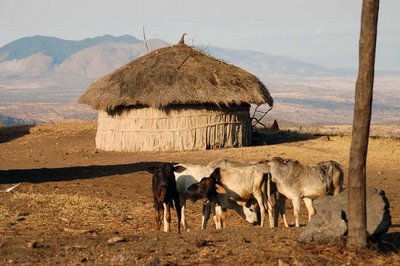 I’m using words like “village” and “boma” but not necessarily accurately. The “village” is probably a number of the communities, each community being a collection of family-related homes. Where we stayed, the people were all related, but they were all also related to the other grouping that were scattered around. “Boma”, which is often used to describe the Maasai home, it actually either the family community or the enclosure made by brush and logs.
I’m using words like “village” and “boma” but not necessarily accurately. The “village” is probably a number of the communities, each community being a collection of family-related homes. Where we stayed, the people were all related, but they were all also related to the other grouping that were scattered around. “Boma”, which is often used to describe the Maasai home, it actually either the family community or the enclosure made by brush and logs.

The Maasai are known for their beadwork and both men and women are highly decorated as a matter of course. They wore more of their special ornamentation (the large collars, the head and face decorations) for us when they were singing, but everyone, down to the littlest child, wears beaded bracelets, earrings, necklaces, and anklets. They are also known for wearing red and even though their clothes are understandably worn and dusty (given the work they do), they look beautiful as they go about their daily lives. We provided a rare break in the routine. Everyone 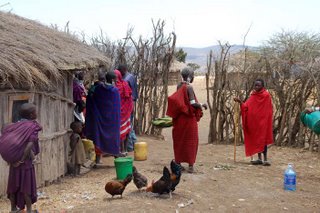 loved our digital watches and the children constantly sneaked up behind us and rummaged through our pockets. The children loved to climb on the car, while the women took advantage of the mirrors to check themselves out! At the same time, I loved watching the cows and goats come in as night fell (the cows are kept in a pen made of logs and branches, goats/sheep in a “house”, calves and kids are in the family homes) and the littlest children “herding” with tiny switches when they weren’t playing. This particular village has no water so the women walk quite far to bring the water up on donkeys and portion it out. The older children attend school and the younger ones tend the animals during the day.
loved our digital watches and the children constantly sneaked up behind us and rummaged through our pockets. The children loved to climb on the car, while the women took advantage of the mirrors to check themselves out! At the same time, I loved watching the cows and goats come in as night fell (the cows are kept in a pen made of logs and branches, goats/sheep in a “house”, calves and kids are in the family homes) and the littlest children “herding” with tiny switches when they weren’t playing. This particular village has no water so the women walk quite far to bring the water up on donkeys and portion it out. The older children attend school and the younger ones tend the animals during the day.
 We gathered away from the homes under a tree—Andrea has engineered a sound recording system that is amazing compact, efficient, and high-tech. She has a professed love for bright, shiny, gadget-y things that beep and squeak, so her job suits her well! The homes are at the top of a hill overlooking a vast plain with the famous volcano Ol Donyo Lengai (an often active volcano) close by and the outside rim of Ngorongoro Crater in the distance. It was an almost surreal contrast of timeless music and culture surrounding 21st century technology.
We gathered away from the homes under a tree—Andrea has engineered a sound recording system that is amazing compact, efficient, and high-tech. She has a professed love for bright, shiny, gadget-y things that beep and squeak, so her job suits her well! The homes are at the top of a hill overlooking a vast plain with the famous volcano Ol Donyo Lengai (an often active volcano) close by and the outside rim of Ngorongoro Crater in the distance. It was an almost surreal contrast of timeless music and culture surrounding 21st century technology.
As the group began to sing, more comparisons to Native Americans came to mind. Not only the colorful clothing and beadwork, their songs are very rhythmic, using no instruments) and there’s a movement that is very organic in how it enhances the singing. The woman move their shoulders and move up and down, making the large collars bob as they sing. The silver bangles jingle throughout.

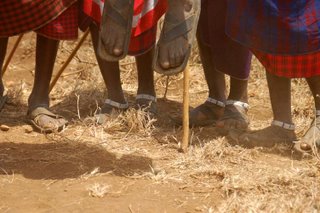 One of the most impressive dances involves the men jumping up and down. It starts almost like a warmup, with the men jumping up and down a few times, then coming down hard with a thump, then moving aside for the next one. As they continue, the singing becomes more intense and louder and the jumping gets higher, almost like a contest or a challenge. It’s just spellbinding and a unique blessing to be able to watch them perform in such a spectacular setting.
One of the most impressive dances involves the men jumping up and down. It starts almost like a warmup, with the men jumping up and down a few times, then coming down hard with a thump, then moving aside for the next one. As they continue, the singing becomes more intense and louder and the jumping gets higher, almost like a contest or a challenge. It’s just spellbinding and a unique blessing to be able to watch them perform in such a spectacular setting.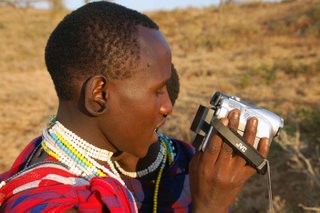
Everyone loved the opportunity to see themselves on camera, and to hear themselves singing after Andrea recorded them. I loved watching them listen to their own music—each person would immediately begin to move and sing along as if they were doing it for the first time.
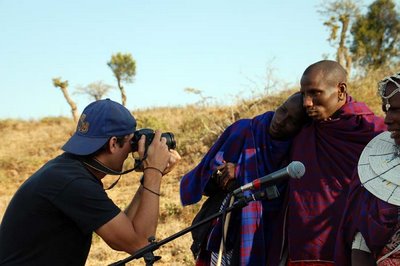 (You’ll notice that many of my pics have microphones or Charles in them…well, I suppose that’s OK…they are the professionals and I guess it’s only right that they would have the better angles.) It's amazing how they were able to completely ignore an "mzungu" (white person) with a camera inches from their face, but they rarely seemed to notice! Make no mistake, though, most people loved getting their pictures taken and then seeing them in the camera! One of the gifts Charles and Andrea are leaving is sound and photos that Aand Serian can use to promote their work as well as working with one of their workers who is doing photography and video. There are some really talented people here who just don't have the means to access training--so Andrea and Charles' time and talents are a huge gift in that respect as well.
(You’ll notice that many of my pics have microphones or Charles in them…well, I suppose that’s OK…they are the professionals and I guess it’s only right that they would have the better angles.) It's amazing how they were able to completely ignore an "mzungu" (white person) with a camera inches from their face, but they rarely seemed to notice! Make no mistake, though, most people loved getting their pictures taken and then seeing them in the camera! One of the gifts Charles and Andrea are leaving is sound and photos that Aand Serian can use to promote their work as well as working with one of their workers who is doing photography and video. There are some really talented people here who just don't have the means to access training--so Andrea and Charles' time and talents are a huge gift in that respect as well.
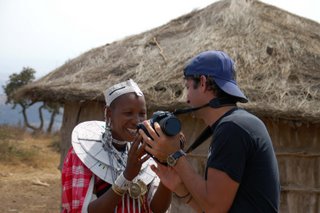 We slept that night in a larger home that Gemma and her husband Lesiker (the Aang Serian leaders) sleep with their family when they are there. It was constructed like the other homes (stick frame covered with mud/dung/ash “cement” and grass roofs) but it was bigger with 3 beds, a couch, chairs, and a “sink” (no plumbing, just buckets). There were 2-3 small windows with glass. There was also a guest bathroom outside, made of plastic over a frame and with an actual padded seat inside. The typical home is much smaller for a family of up to 8 people. There would be one central room with a small firepit for cooking. There would be a bed made of cowhide covering grass that would double as a seat where everyone would sleep (or sleep on the floor). Part of the room would be walled off, where the calves or kids (goats) would stay at nigh. Windows are narrow slits. Compared to Il Boru, where we live, the silence was heavenly—well, except for that one donkey that had plenty to say several times that night! Before going to sleep I stepped outside to most beautiful
We slept that night in a larger home that Gemma and her husband Lesiker (the Aang Serian leaders) sleep with their family when they are there. It was constructed like the other homes (stick frame covered with mud/dung/ash “cement” and grass roofs) but it was bigger with 3 beds, a couch, chairs, and a “sink” (no plumbing, just buckets). There were 2-3 small windows with glass. There was also a guest bathroom outside, made of plastic over a frame and with an actual padded seat inside. The typical home is much smaller for a family of up to 8 people. There would be one central room with a small firepit for cooking. There would be a bed made of cowhide covering grass that would double as a seat where everyone would sleep (or sleep on the floor). Part of the room would be walled off, where the calves or kids (goats) would stay at nigh. Windows are narrow slits. Compared to Il Boru, where we live, the silence was heavenly—well, except for that one donkey that had plenty to say several times that night! Before going to sleep I stepped outside to most beautiful  stargazing I’d ever seen. No light pollution for hundreds and hundreds of miles. The sky was perfectly clear, the Milky Way bright, the stars actually twinkling…I think there may not be a better place on earth to watch the stars!
stargazing I’d ever seen. No light pollution for hundreds and hundreds of miles. The sky was perfectly clear, the Milky Way bright, the stars actually twinkling…I think there may not be a better place on earth to watch the stars!
The next morning we reconvened to record another 4-5 songs, including more jumping. Fantastic! You’ll notice that in many of the pictures people, but the men especially, are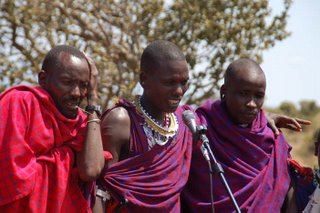 standing very close, often with their arms around each other. It’s a very common sight, even in town, when you see Maasai gathered together. I suppose it’s an extension of living in an extended family setting where everyone’s somehow related, not to mention the very close quarters where everyone lives and sleeps. But it’s more than that—they always seem
standing very close, often with their arms around each other. It’s a very common sight, even in town, when you see Maasai gathered together. I suppose it’s an extension of living in an extended family setting where everyone’s somehow related, not to mention the very close quarters where everyone lives and sleeps. But it’s more than that—they always seem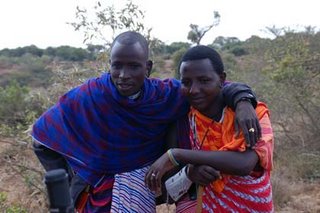 to be easily amused and truly enjoy each other when they’re together. Our driver, who comes from a region near where we live, confirmed this. He confirmed that the Maasai have a reputation for getting along well and really enjoying each other.
to be easily amused and truly enjoy each other when they’re together. Our driver, who comes from a region near where we live, confirmed this. He confirmed that the Maasai have a reputation for getting along well and really enjoying each other.
It was time to leave. I wanted to stay, although I’m not sure what I’d do. I’m so grateful for the 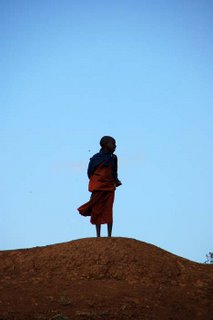 opportunity to be able to be there for more than some sort of cultural visit—a drop in and look around and leave type of thing—and to get a glimpse of a lifestyle that is so vastly different in every aspect from anything I’ve ever known. It’s hard to describe the experience and my pictures certainly don’t do it justice—perhaps some of the professional shots will make their way here at some point. In any case, it’s a slice of a life that is changing quickly—it was a privilege to be able to catch a bit of it this week.
opportunity to be able to be there for more than some sort of cultural visit—a drop in and look around and leave type of thing—and to get a glimpse of a lifestyle that is so vastly different in every aspect from anything I’ve ever known. It’s hard to describe the experience and my pictures certainly don’t do it justice—perhaps some of the professional shots will make their way here at some point. In any case, it’s a slice of a life that is changing quickly—it was a privilege to be able to catch a bit of it this week.
I just reviewed this before publishing and I'm surprised how familiar all these faces looked to me after just such a short time. The Maasai are a common sight all around Arusha, and my guards and gardener look just like all of these guys...I just can't imagine buzzing in and out of a cultural photo op. and thinking that I had any sense of life for this group of people. Not that I really have an understanding at this point myself...life changing? Well, isn't this whole journey life-changing? But even this brief experience makes me want to learn more, do more, experience more...and THAT is life-changing, no matter where you are.
 This was Oprah's first pick when she restarted up her book club again a few years ago. It's the story of Cain and Abel played out over 3 generations of Californians at the turn of the century. The struggles of the brothers revolve around those verses in Genesis in which both Able and Cain bring offerings to God--God is pleased with Abel's offerings but not Cain's, leading to jealousy and the eventual murder of Abel. The desire to please a father and continually coming up short in comparison to a brother is at the heart of the novel.
This was Oprah's first pick when she restarted up her book club again a few years ago. It's the story of Cain and Abel played out over 3 generations of Californians at the turn of the century. The struggles of the brothers revolve around those verses in Genesis in which both Able and Cain bring offerings to God--God is pleased with Abel's offerings but not Cain's, leading to jealousy and the eventual murder of Abel. The desire to please a father and continually coming up short in comparison to a brother is at the heart of the novel. erican novels ever. Period. Steinbeck wrote it in 1939, right on the heels of the Dust Bowl and immediately understand the pain and devaluation of people that was happening. His descriptions of the Joads alternate with chapters of the larger collective conscience of those displaced people. It's sparse--no wasted words or flowery descriptions, but practically perfect in its rendering of life. Everyone's probably seen the Henry Fonda movie, but read the book.
erican novels ever. Period. Steinbeck wrote it in 1939, right on the heels of the Dust Bowl and immediately understand the pain and devaluation of people that was happening. His descriptions of the Joads alternate with chapters of the larger collective conscience of those displaced people. It's sparse--no wasted words or flowery descriptions, but practically perfect in its rendering of life. Everyone's probably seen the Henry Fonda movie, but read the book. time and place. My two Jane Austen crazy friends (and 3 watchings of the recent movie while traveling to Tanzania) inspired me to read "Pride and Prejudice." Which, I admit, was helped along having seen the movie first. But the structure of society at that time, the manners and expectations, and the wit are terrific. I'm onto "Sense and Sensibility" now (which also was made into a recent movie, but one I haven't seen).
time and place. My two Jane Austen crazy friends (and 3 watchings of the recent movie while traveling to Tanzania) inspired me to read "Pride and Prejudice." Which, I admit, was helped along having seen the movie first. But the structure of society at that time, the manners and expectations, and the wit are terrific. I'm onto "Sense and Sensibility" now (which also was made into a recent movie, but one I haven't seen). owners and sellers in (I think) South Carolina. Because of his family's meticulous (bordering on obsessive) record-keeping in all aspect of their lives, he has been able to trace slaves owned by his family back to villages in Africa. For those African-American descendents, they are some of the very few who can pinpoint where their ancestors came from. I'm not a big non-fiction fan, but this one I couldn't put down.
owners and sellers in (I think) South Carolina. Because of his family's meticulous (bordering on obsessive) record-keeping in all aspect of their lives, he has been able to trace slaves owned by his family back to villages in Africa. For those African-American descendents, they are some of the very few who can pinpoint where their ancestors came from. I'm not a big non-fiction fan, but this one I couldn't put down.














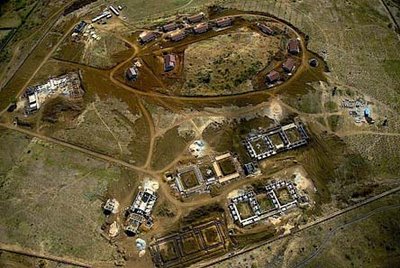
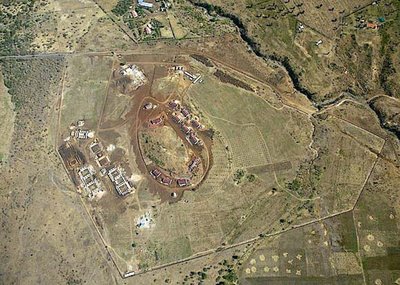
 This week I had an amazing opportunity to spend two days and overnight in a Maasai village called Eluyai, about 3 hours from Arusha. Mileage-wise, it’s really not very far, but in terms of road conditions (or lack of roads) and culture, it’s another world enti
This week I had an amazing opportunity to spend two days and overnight in a Maasai village called Eluyai, about 3 hours from Arusha. Mileage-wise, it’s really not very far, but in terms of road conditions (or lack of roads) and culture, it’s another world enti








 One of the most impressive dances involves the men jumping up and down. It starts almost like a warmup, with the men jumping up and down a few times, then coming down hard with a thump, then moving aside for the next one. As they continue, the singing becomes more intense and louder and the jumping gets higher, almost like a contest or a challenge. It’s just spellbinding and a unique blessing to be able to watch them perform in such a spectacular setting.
One of the most impressive dances involves the men jumping up and down. It starts almost like a warmup, with the men jumping up and down a few times, then coming down hard with a thump, then moving aside for the next one. As they continue, the singing becomes more intense and louder and the jumping gets higher, almost like a contest or a challenge. It’s just spellbinding and a unique blessing to be able to watch them perform in such a spectacular setting.








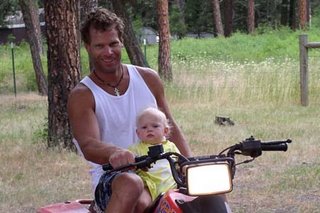
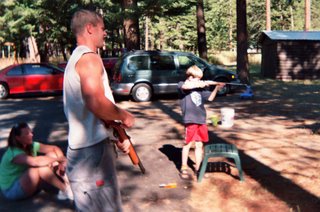
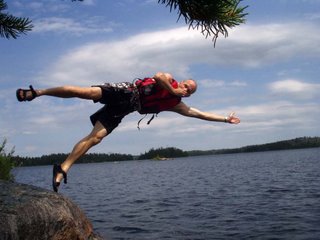






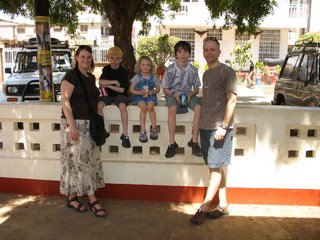 This is us on our first full day in Tanzania. My friend Lindsay posted a funny pic of her and her attempt to get all 4 kids to "look nice" for a family shot. It's been my experience that if you want a nice family picture don't have more than 2 kids. You just can't control for more than that. This one is rare, because we're all in it and we're all looking pretty normal and not too shell-shocked. Cameron looked at the picture and said, "Geeze, that was a long time ago!" It was 7 months ago--but in some ways a lifetime. We are not the same people that you see in the picture. We are changing in little and in fundamental ways, learning about ourselves as parents, Christians, and Americans, trying to discern what is the best of what we are and what we have to give. We are truly blessed by the family you see here, the friends that are reading this, and the God that provides what we truly need.
This is us on our first full day in Tanzania. My friend Lindsay posted a funny pic of her and her attempt to get all 4 kids to "look nice" for a family shot. It's been my experience that if you want a nice family picture don't have more than 2 kids. You just can't control for more than that. This one is rare, because we're all in it and we're all looking pretty normal and not too shell-shocked. Cameron looked at the picture and said, "Geeze, that was a long time ago!" It was 7 months ago--but in some ways a lifetime. We are not the same people that you see in the picture. We are changing in little and in fundamental ways, learning about ourselves as parents, Christians, and Americans, trying to discern what is the best of what we are and what we have to give. We are truly blessed by the family you see here, the friends that are reading this, and the God that provides what we truly need.





